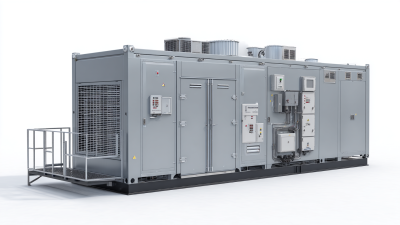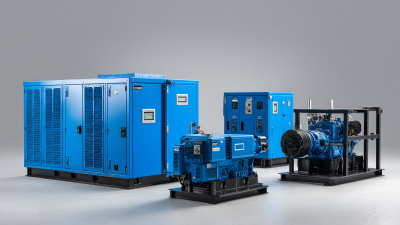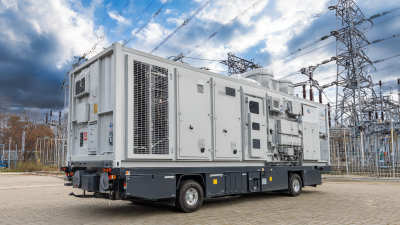How to Maximize Efficiency with a 250kw Generator for Your Business Needs
Table of Contents
- Understanding the Basics of 250kw Generators for Business Applications
- Key Factors to Consider When Selecting a 250kw Generator
- Strategies to Optimize Fuel Efficiency in Your Generator Operations
- Maintenance Tips to Enhance the Longevity of Your Generator
- Comparing Backup Power Solutions: 250kw Generators vs. Alternatives
- Real-World Case Studies: Success Stories with 250kw Generators in Business
- Unleashing Power and Reliability: Exploring the EFFICIENT AND DURABLE DOOSAN DIESEL GENERATOR 50KW-730KW
- FAQS
- Conclusion
- Related Posts
In today’s whirlwind business world, making sure you’ve got a steady power supply isn’t just nice to have — it’s absolutely crucial for keeping things running smoothly. A 250kW generator? That can be a real game-changer for lots of different businesses. Thanks to the guys at JIANGSU LONGEN POWER TECHNOLOGY CO., LTD., who are experts in making diesel generator sets, companies can really tap into the full power of what they’ve got. Their range is pretty impressive, from 5KVA all the way up to 3300KVA, and they use top-notch engines from brands like Perkins, Cummins, Doosan, and others, paired with high-quality alternators from Stamford and Leroy Somer. In this blog, we’ll share some practical tips on how to get the most out of your 250kW generator — making sure it’s tailored to your business’s unique needs, boosting productivity, and keeping things reliable and affordable. So, stick with us as we explore some straightforward ways to optimize your energy use and keep your operations humming along without a hitch.

Understanding the Basics of 250kw Generators for Business Applications
Thinking about getting a 250kW generator for your business? It’s pretty important to get a good grasp of what’s going on in the gas generator market. Honestly, the global market for gas generators has been growing pretty fast. I mean, reports are pointing to a jump from around $5.2 billion back in 2021 to nearly $7.8 billion by 2028. That’s a big deal, and it’s mainly because energy needs are climbing, plus there's this shift toward greener power sources. So, gas generators are quickly becoming the go-to choice for businesses that want reliable, efficient power without the fuss.
If you break down the market by size, those generators in the 101 kW to 500 kW range are really taking up a big slice. They’re super popular in industrial and commercial setups that need a decent amount of power, but not something massive. Specifically, the 250kW models are seeing a lot of interest lately. That’s mainly because they hit that sweet spot for small and medium-sized businesses that want to keep things running smoothly during outages — all while keeping within environmental rules. Plus, you see these generators popping up a lot in construction sites, telecom setups, and data centers. They need to be tough, reliable, and efficient, and that’s what makes the 250kW unit a smart buy. It’s like, you’re investing in something that really makes your business run more smoothly and confidently, no matter what’s happening with the power grid.
Key Factors to Consider When Selecting a 250kw Generator
So, if you're in the market for a 250kW generator for your business, there are quite a few things you’ll want to keep in mind to make sure you’re getting something reliable and efficient.
First off, the type of fuel it uses is a big deal. Have you heard about the booming India diesel generator market? It’s expected to hit around $2.59 billion by 2032, and diesel generators are really popular there. They’re appreciated for being tough and generally cheaper to run than gasoline ones. Totally makes sense if you're after steady, dependable power.
But here’s the thing—before you pick a generator, you really need to check how much power your business actually needs. Doing a quick energy assessment can save you from overspending or ending up with something too small. Oh, and don’t forget—efficiency and emissions standards are a growing concern these days. Picking a generator that ticks those boxes isn’t just about staying compliant; it also shows your commitment to sustainability, which can give your business a bit of a green edge and attract eco-conscious customers. As the energy scene gets more advanced and competitive, staying updated and choosing the right gear is crucial for keeping things running smoothly now and into the future.
Strategies to Optimize Fuel Efficiency in Your Generator Operations
Keep in mind, getting the most out of your 250kW generator isn’t just about saving money — it’s also about being kind to the environment. A key step here is regular maintenance. Think oil changes, swapping out air filters, checking those fuel injectors — stuff that keeps your generator running smoothly. When it’s well taken care of, it doesn’t just perform better, but it also drinks less fuel, which means your costs stay down. Plus, a properly maintained machine is way less likely to break down unexpectedly—nobody wants costly downtime, right?
Another tip is to get a handle on load management. Basically, knowing how much power your business really needs helps you run the generator at about its optimal capacity—that’s when it’s most fuel-efficient. You might do things like staggering equipment use or using load banks to match how much energy you actually need. Oh, and investing in tech like energy monitoring systems can be a game-changer. They give you real-time data, so you can tweak your operations accordingly. All this just means you’re squeezing every bit of efficiency out of your generator while keeping those fuel costs in check.
It’s all about being a bit smarter with your energy use — and honestly, a little regular upkeep can go a long way!
Maintenance Tips to Enhance the Longevity of Your Generator
Keeping up with regular maintenance is honestly one of the best ways to make sure your 250kw generator keeps running smoothly and lasts longer. A good place to start is setting up a consistent schedule—you know, like marking it on your calendar so you don’t forget. Make sure to routinely check the oil and coolant levels, and swap out filters when they need it. Sticking to what the manufacturer recommends might seem like a small thing, but it really helps prevent unexpected problems and keeps everything running at its best.

Also, don’t forget to keep your generator clean—dirt and grime can slow things down or even cause overheating. Giving it a good wipe-down now and then, and eyeballing any signs of rust or wear on parts, can make a big difference in how long it lasts. And hey, testing it under load every now and then is a smart move, so you’re sure it can handle the workload without any hiccups.
Lastly, staying on top of how it’s performing is super important. Keep an eye on fuel use and output—these little checks can alert you early if something’s off. If you're unsure, bringing in a pro for a more thorough inspection can spot hidden issues before they become big headaches. All these steps combined can really help ensure your generator continues to serve you well for years to come.
Comparing Backup Power Solutions: 250kw Generators vs. Alternatives
When it comes to finding reliable backup power, more and more businesses are starting to compare traditional 250kW generators with newer options like hydrogen fuel cells. These fuel cell systems are really catching on—mainly because they’re zero-emission and can keep critical operations running smoothly without that usual carbon footprint we see with regular generators. One recent pilot project, for example, showed off hydrogen-powered setups that could actually work as backup power for things like data centers, which basically need to be online 24/7.

And here's the thing— as the global demand for strong, efficient backup power keeps climbing, the market for generators—whether traditional or fuel-cell based—is expected to grow a lot. More companies are also paying attention to sustainability now, not just the short-term perks of 250kW generators but also the long-term benefits of alternatives like portable fuel cells. As hydrogen infrastructure gets better and more widespread, industries might start shifting towards cleaner, greener energy options that aren’t just reliable but also meet the ever-stricter environmental standards. It’s an exciting time for sure, with a lot of changes on the horizon!
Real-World Case Studies: Success Stories with 250kw Generators in Business
In today’s super busy business world, having the right power solutions isn’t just a nice-to-have — it’s kind of essential for running things smoothly. Take the manufacturing sector, for example. There’s a company that used a 250kW generator to keep things going during their peak hours. Not only did this keep the lights on and machines running nonstop, but it also cut downtime by about 30%, according to a report from the Electrical Generating Systems Association (EGSA). Because of this, their productivity shot up pretty significantly — smooth operations of heavy machinery mean they could get more done, right? And industry stats back this up, showing about a 20% bump in output when power’s reliable.
On the flip side, in construction, a big contractor decided to go with a 250kW generator to power multiple sites all at once. This was a game-changer — it let them run all their tools and equipment without tripping circuits or overloading. They even managed to cut operational costs by roughly 15%. Plus, the National Fire Protection Association (NFPA) pointed out that companies using backup generators like this one reported being safer and more compliant during power outages. All in all, these stories really drive home how investing in a solid 250kW generator can make a real difference — boosting efficiency, reducing downtime, and keeping things running smoothly, no matter what’s happening outside.
How to Maximize Efficiency with a 250kw Generator for Your Business Needs - Real-World Case Studies: Success Stories with 250kw Generators in Business
| Case Study | Business Type | Location | Operational Efficiency Improvement (%) | Challenges Addressed | Outcome |
|---|---|---|---|---|---|
| Manufacturing Plant A | Manufacturing | California, USA | 30% | Frequent power outages | Increased production uptime |
| Retail Store B | Retail | New York, USA | 25% | Loss of sales during outages | Increased sales revenue |
| Hospital C | Healthcare | Texas, USA | 40% | Critical patient care interruptions | Improved patient care reliability |
| Data Center D | Technology | Washington, USA | 50% | Server downtime due to power issues | Enhanced data processing uptime |
Unleashing Power and Reliability: Exploring the EFFICIENT AND DURABLE DOOSAN DIESEL GENERATOR 50KW-730KW
In the realm of power generation, the Doosan Diesel Generator ranging from 50KW to 730KW stands out for its efficiency and durability. This generator is engineered to deliver consistent performance under diverse operational conditions, making it an ideal choice for various applications, including commercial, industrial, and emergency power needs. According to a recent report by the International Energy Agency, diesel generators are expected to play a crucial role in the energy mix, particularly in regions with unreliable power supply. The efficiency of the Doosan generator can significantly reduce operational costs while maintaining high reliability, meeting the demands of industries that cannot afford downtime.
Hyundai, established in 1896, has made a significant mark in the power products sector, especially after its acquisition of Hyundai Engine. The advancements in their diesel engines have set benchmarks for quality and durability across multiple sectors, including defense, aviation, and engineering machinery. A market analysis by Frost & Sullivan suggests that the global diesel generator market is projected to grow at a CAGR of 5.4% through 2025, which emphasizes the essential role of robust and efficient power solutions like the Doosan Diesel Generator. The combination of cutting-edge technology and proven reliability positions Doosan as a leading choice for users seeking comprehensive power solutions.
FAQS
: The global gas generator market was valued at approximately USD 5.2 billion in 2021 and is projected to increase to around USD 7.8 billion by 2028.
The demand for 250kW generators is growing due to their ideal capacity to support small to medium-sized enterprises during power outages while complying with environmental regulations.
Businesses in sectors such as construction, telecommunications, and data centers benefit significantly from 250kW generators as they require reliable and efficient power solutions.
While 250kW generators provide reliable backup power, hydrogen fuel cells are emerging as a zero-emission alternative, offering the potential for sustainable power without the carbon footprint of traditional generators.
As hydrogen infrastructure develops, industries may experience benefits such as enhanced reliability, reduced environmental impact, and compliance with evolving standards through the use of hydrogen fuel cells.
The growth of the generator market is driven by rising energy demands and the transition to cleaner power sources as businesses seek efficient backup power solutions.
Conclusion
In today's busy business world, making sure you have reliable power is a big deal, and a 250kW generator plays a key role in keeping everything running smoothly without interruptions. It’s really important to understand the basics of these powerful units because they serve as dependable backup power sources for all kinds of business needs. When you're picking out a generator, things like fuel efficiency, how much load it can handle, and how easy it is to maintain should be on your radar. Finding ways to save on fuel not only cuts costs but can also make things run more efficiently overall.
And let’s not forget — regular maintenance is super important if you want your generator to last longer and perform well. Comparing different backup power options shows that dedicated generators like these have some pretty clear advantages, especially in critical situations where power can’t go out. There are plenty of real-world stories of companies that have benefited from investing in a 250kW unit — it’s proven to be a game-changer for their operations. Companies like Jiangsu Longen Power Technology Co., Ltd. stand out by offering top-notch design, manufacturing, and support, so you can trust that your power needs are in good hands.
Related Posts
-

Solutions for Reliable Power with 250kw Generator in Global Markets
-

7 Essential Tips for Choosing the Best Cummins Engine for Your Needs
-

Innovative Applications of Powered By Mtu in Diverse Industries
-

Quality Drives Global Success: Introducing the Best 1MW Generator Set Powered by MTU from China
-

60kva Generator Showdown: Which Model Reigns Supreme in Performance and Efficiency?
-

What is the Advantage of Choosing the Best 200kw Generator for Your Business
Blog Tags:


